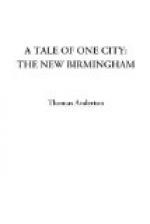Some of us rather preferred the old order of things. We liked and still like to go to shops kept by tradesmen who have been brought up to certain lines of business, and who know from actual knowledge and experience what they are buying and selling. But in these large new shops and Stores people sell you almost everything without having any special knowledge of anything. They recommend this, that, and the other, but you have often good reason to know that it is not from any experience of the commodities they offer, but only the tradesman’s instinct and desire to dispose of what he wants most to sell rather than what his customers may most wish to buy.
Such is the new style of large shopkeeping, and it is not, of course, peculiar to Birmingham. It must be owned, however, that it means cheapness, and also that it has been largely developed by the new order of things brought about by the recent street improvements in the city.
IV.
Ecce Mr. Chamberlain.
Having said so much of what Mr. Chamberlain has done in, and for, Birmingham, perhaps I may be permitted to say a few words, “mostly all” my own, respecting a much biographed man. Although Mr. Chamberlain is so prominently identified with Birmingham and Birmingham with him, it is well known that he is not a native of the place. He was born in London in 1836, and came to Birmingham in 1854. We took him in and he did for us. His father joined the well-known firm of Nettlefold, the wood screw makers, and in the course of time his eldest son, Joseph, succeeded him. Mr. Joseph Chamberlain soon found his feet in trade, and by his business acumen, his foresight, capacity, and shrewdness he advanced the business, which had already been highly successful, to a rare pitch of prosperity.
At one time I saw and heard much of Mr. Chamberlain, especially in the earlier part of his Birmingham public career. He was always what he is now—a sharp, smart, and ready man. A man to inspire admiration and confidence. There was always a promptness and “all thereness” in his nature, with a decided touch of self-reliance, and I may even say audacity. In fact, without intending any reflection upon him, I might perhaps suggest that he could appropriately take as his motto “De l’audace, encore de l’audace, et toujours de l’audace.” In proof of this I may cite one or two incidents that came under my notice.
Some thirty years or more ago Mr. Chamberlain was a prominent member of a local debating society. Now, this society used to have every year two social gatherings, and it was observed that many members who rarely or never came to the debates were not conspicuous by their absence when the summer “outings” and other little feasts took place. The committee thought it would be rather good sport to give these knife and fork debaters a little mild and gentle rub. Consequently they made them the subject of a toast at one of their social meetings, held at the Lyttelton Arms, Hagley. A word was coined for the occasion, and they were toasted as the “Artopsareocoluthic Members” (signifying the lovers of the loaves and fishes), and to Mr. Chamberlain was entrusted the task of proposing the toast.




